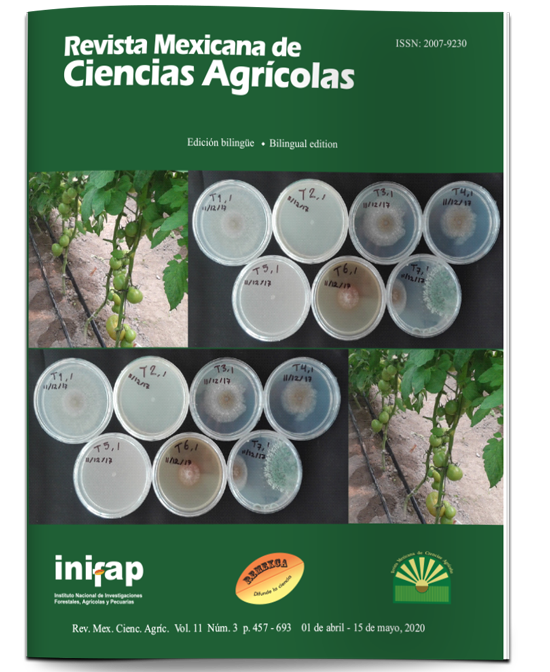Phosphatase-alkaline activity and growth of rice with biological inoculation and micronutrients
DOI:
https://doi.org/10.29312/remexca.v11i3.1873Keywords:
Azospirillum brasilense, Oryza sativa L., enzymatic activity, inoculationAbstract
Inoculation with growth promoting bacteria in crops is an alternative to reduce the use of nitrogen fertilizers and production costs. The objective of this research was to evaluate the effect of inoculating Oryza sativa L. rice seeds with the bacteria Azospirillum brasilense on the enzymatic activity of alkaline phosphatase and its growth. The research was carried out at the Faculty of Agrarian Sciences and the Faculty of Chemical Sciences of the National University of Asuncion, Paraguay. A completely randomized design with five treatments and five repetitions was used. Treatments consisted of T1 (Absolute Control): untreated rice seeds, T2 (Co+Mo): rice seeds treated with cobalt plus molybdenum, T3 (Az): rice seeds inoculated with A. brasilense, T4 (Az+1F): rice seeds inoculated with A. brasilense plus one foliar application of the inoculant and T5 (Az+2F): rice seeds inoculated plus two foliar applications. Anava and Tukey’s test (p<0.05) were applied for the analysis of agronomic variables and the Kruskal-Wallis test (p<0.05) for enzymatic evaluations. The variables evaluated were root length (cm), dry mass of aerial parts and roots (g), and alkaline phosphatase enzyme activity (μg de PNP g-1 soil h-1). No significant differences were observed between treatments with Azospirillum brasilense regarding dry mass. Phosphatase activity in treatments with A. brasilense ranged from 1 655.49 in T3 to 7 429.55 μg of PNP g-1 soil h-1 in T4. The use of cobalt and molybdenum-based micronutrients led to greater root growth.
Downloads
Published
How to Cite
Issue
Section
License
The authors who publish in Revista Mexicana de Ciencias Agrícolas accept the following conditions:
In accordance with copyright laws, Revista Mexicana de Ciencias Agrícolas recognizes and respects the authors’ moral right and ownership of property rights which will be transferred to the journal for dissemination in open access. Invariably, all the authors have to sign a letter of transfer of property rights and of originality of the article to Instituto Nacional de Investigaciones Forestales, Agrícolas y Pecuarias (INIFAP) [National Institute of Forestry, Agricultural and Livestock Research]. The author(s) must pay a fee for the reception of articles before proceeding to editorial review.
All the texts published by Revista Mexicana de Ciencias Agrícolas —with no exception— are distributed under a Creative Commons License Attribution-NonCommercial 4.0 International (CC BY-NC 4.0), which allows third parties to use the publication as long as the work’s authorship and its first publication in this journal are mentioned.
The author(s) can enter into independent and additional contractual agreements for the nonexclusive distribution of the version of the article published in Revista Mexicana de Ciencias Agrícolas (for example include it into an institutional repository or publish it in a book) as long as it is clearly and explicitly indicated that the work was published for the first time in Revista Mexicana de Ciencias Agrícolas.
For all the above, the authors shall send the Letter-transfer of Property Rights for the first publication duly filled in and signed by the author(s). This form must be sent as a PDF file to: revista_atm@yahoo.com.mx; cienciasagricola@inifap.gob.mx; remexca2017@gmail.
This work is licensed under a Creative Commons Attribution-Noncommercial 4.0 International license.



